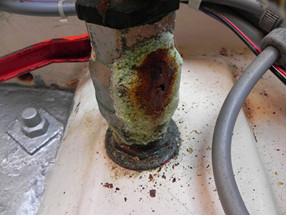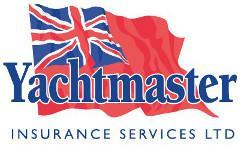The 2011 3 Rivers Race has come and gone and a breezy affair it was! Several of our customer’s craft came to grief in one way or another but these are now being dealt with. The Yachtmaster Team didn’t race this year due to having become very firmly grounded in Heigham Sound in 2010 and, having established that the Broads Authority hasn’t yet dredged this area, we expected the same again.

There have recently been several reports in the yachting press about vessels being fitted with inferior brass seacocks and these seacocks failing at an early stage in their life with potentially serious consequences. Our in-house surveyor actually found one himself about 3 weeks ago, the reporting of which helped to prevent a £100,000 yacht going to the bottom! Fortunately the vessel was ashore when his probe went straight through the wall of the seacock. (Photo supplied by GMS Marine)
You might think that the consequences of such an unseen failure would be covered by all good quality insurance policies – however you would be wrong! I hasten to add that our Yachtmaster Binding Authority policies do not specifically exclude incidents like gradual incursion of water for example.
However some policies available in the market today do exclude the consequences of gradual incursion of water into a vessel or water escaping from appliances or pipes or gradual leakage. Imagine the consequences of leaving your cherished vessel on her mooring for a couple of weeks, then receiving a call from the marina to say that she had sunk and subsequently finding out after a few frantic ‘phone calls that your insurance policy gave you no cover at all for that type of loss! It’s a serious gap in cover and it’s not just seacocks that might fail, there’s the shaft, gaiters etc. etc.
Insurers generally require you to keep your vessel in a seaworthy condition – that’s sensible. Failure to do so, such as a timber vessel being left with rotting planks around the waterline leading to the inevitable sinking, is likely to result in all insurers declining the resulting claim, and rightly so, that’s pure neglect.
However, the seacocks issue is different. Inferior fittings made from forged brass to the European standard CW617N are in very common use; ordinary brass such as this is subject to dezincification in seawater and can fail in less than 5 years whereas an owner might unknowingly expect them to be good for perhaps 15 to 20 years. Astonishingly such valves conform with the standards laid down by the Recreational Craft Directive and in many cases look very much like dzr (dezincification resistant brass), being the more suitable material along with bronze. Many of these fittings are in fairly inaccessible places and the chances are they may not therefore receive the sort of regular inspection that a more accessible fitting would. To deny an owner insurance cover for a very expensive loss in these circumstances is not reaching the level of service that we feel our industry should be offering.
Points to note then are:-
1. Read your insurance policy carefully and challenge any dubious wording or exclusions.
2. Before purchase, and every few years thereafter, have a qualified surveyor inspect the vessel thoroughly. You may know a lot about boats, but he is trained to know more!
Finally, nearly all insurers require vessels over about 20 to 25 years of age to have had a recent survey before offering cover. The reason is pretty obvious – we want to know that the vessel is in good shape. We frequently have potential customers contacting us who have bought an older vessel without a survey and sometimes without even seeing the vessel out of the water, and we simply will not offer them cover without a proper out of water inspection. Surveys often reveal all sorts of problem areas – including large repairs below the waterline which are about to fail! Better to discover these before you buy rather than afterwards and may give you the opportunity to negotiate the purchase price or even pull out of the purchase if any serious defects are discovered.
To summarise, check your policy wording, and your seacocks!
D. Long - 9/6/2011
Return to Media Publications & Advice.

